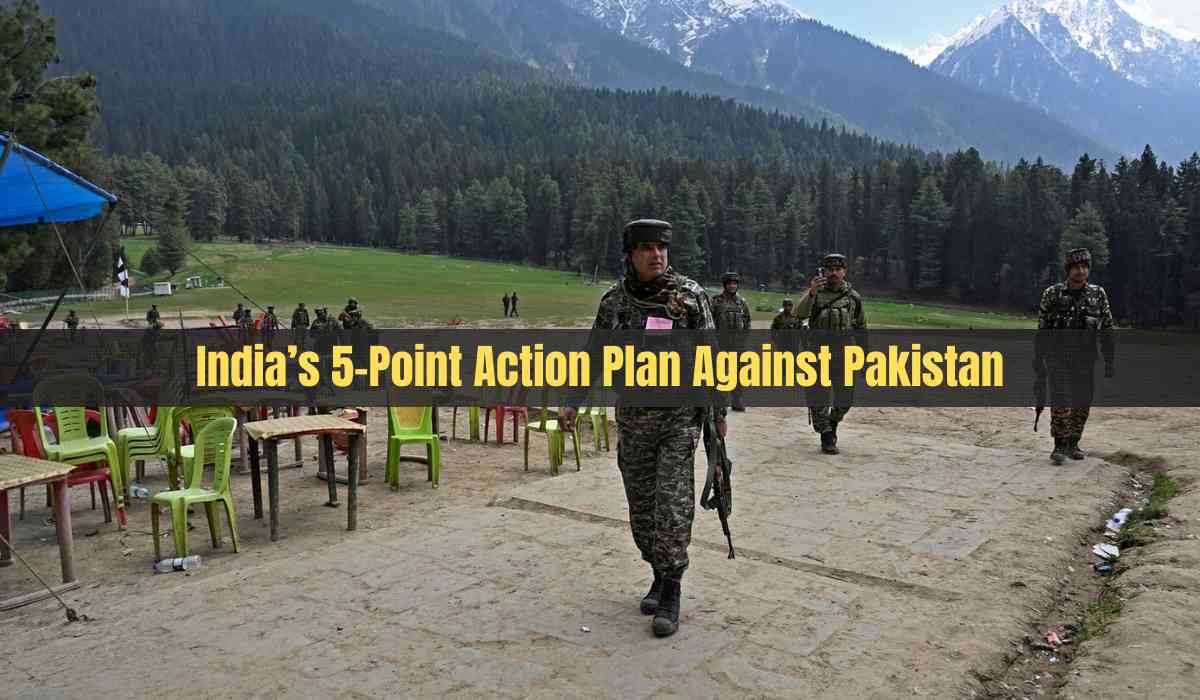In a brazen and deadly act of terrorism in Pahalgam, Jammu and Kashmir, that claimed 28 lives, including 26 Indian citizens and 2 foreign nationals, India has announced a comprehensive five-point action plan targeting Pakistan. The response comes after credible evidence linked the attack to Pakistan-based militant groups, triggering strong condemnation and swift action from the Indian government. This has been described as one of the deadliest terror attacks in the region in nearly two decades, shaking the nation and drawing global attention.
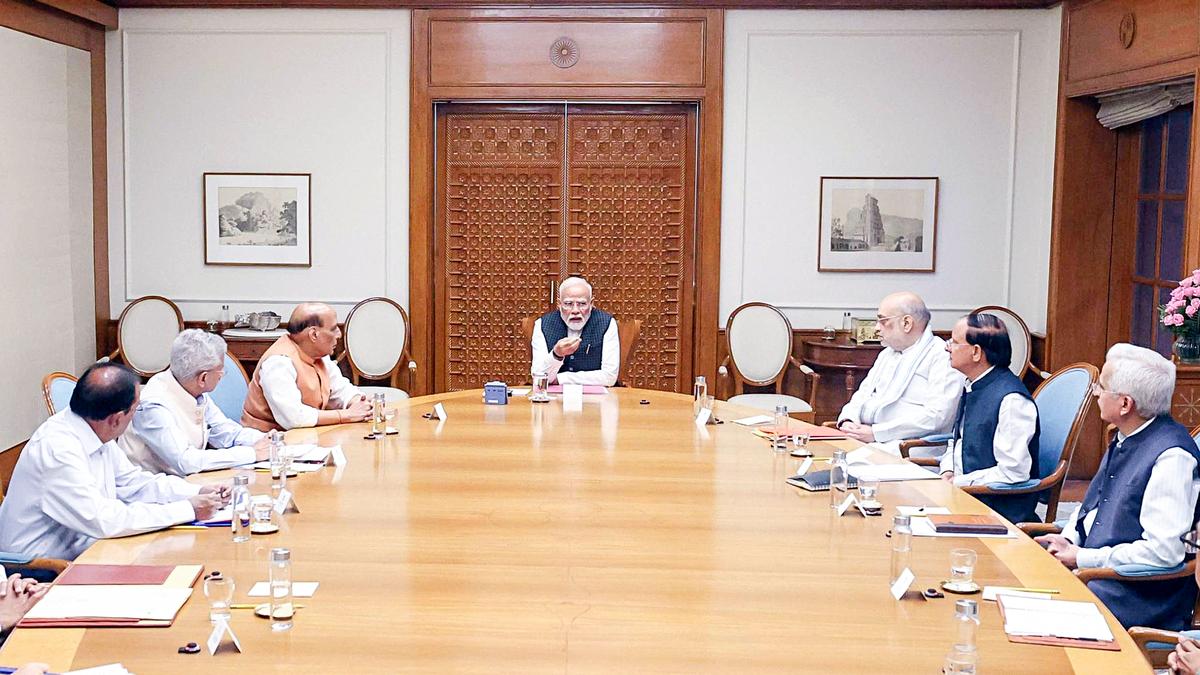
Overview of the Pahalgam Terror Attack
On April 20, 2025, heavily armed militants ambushed a group of tourists in Pahalgam, one of Jammu and Kashmir’s most visited destinations. The attackers, believed to be seven in number, opened indiscriminate fire, killing 28 people and injuring many more. Early reports confirmed that several attackers were Pakistani nationals.
Union Home Minister Amit Shah visited the attack site and also met injured survivors at a local hospital. The attack—one of the most brutal in the region since the 2019 Pulwama bombing—has been viewed as a direct assault on the region’s growing stability, tourism, and post-election development.
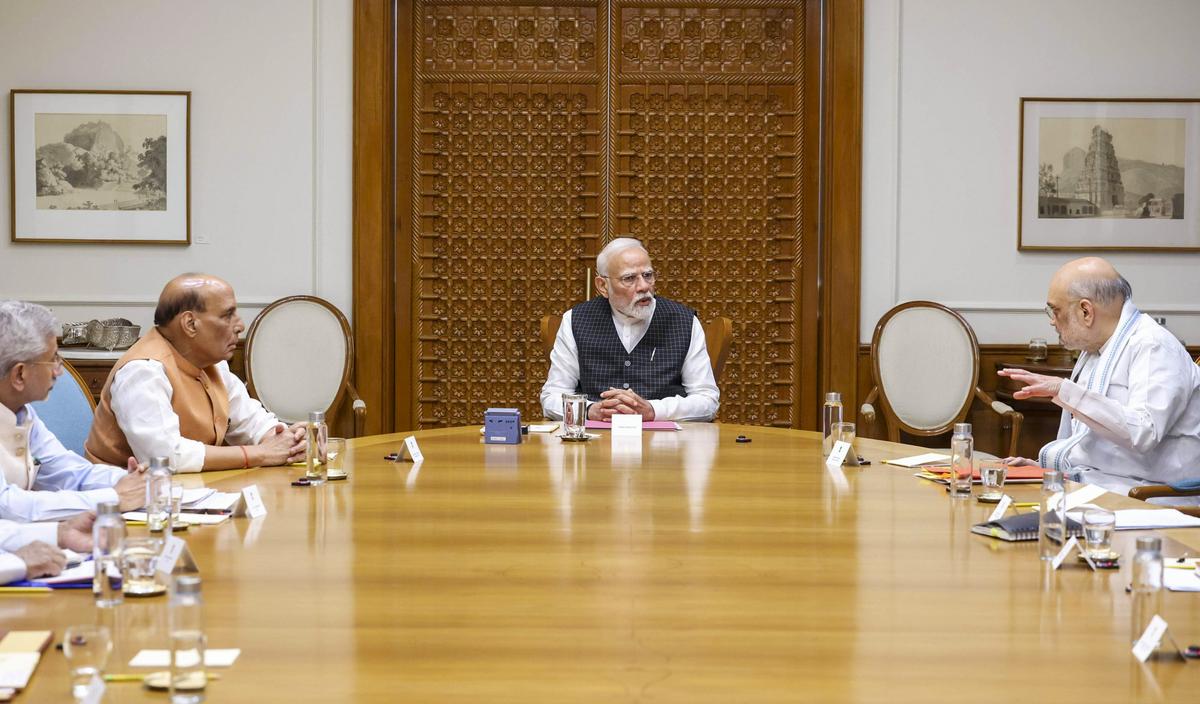
Cabinet Committee on Security (CCS) Takes Charge
The Cabinet Committee on Security (CCS), India’s apex decision-making body on national security, convened an emergency session to discuss the incident. The meeting was attended by:
-
Home Minister Amit Shah
-
Defence Minister Rajnath Singh
-
External Affairs Minister S. Jaishankar
-
National Security Advisor Ajit Doval
The CCS unanimously agreed on taking strong and unprecedented measures against Pakistan, leading to the announcement of a five-point strategic response.
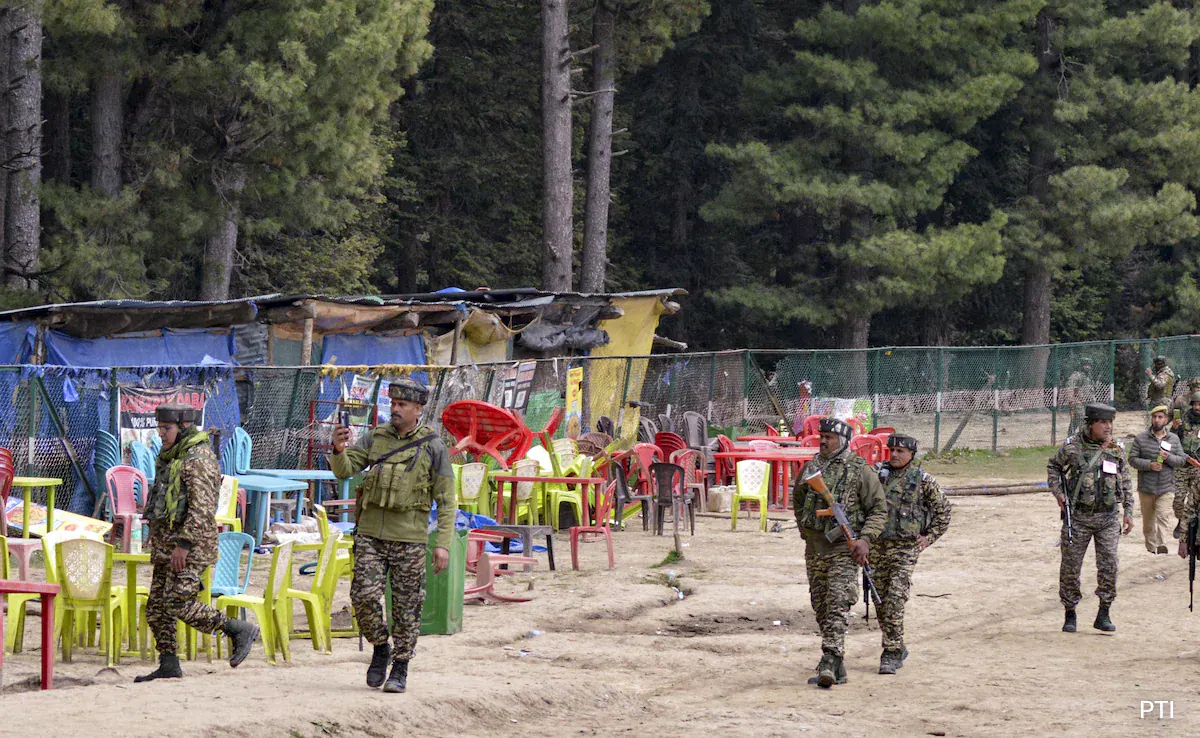
India’s 5-Point Action Plan Against Pakistan
1. Suspension of the Indus Waters Treaty
-
India has suspended the 1960 Indus Waters Treaty, a landmark agreement on water sharing between India and Pakistan.
-
This move is aimed at pressuring Pakistan to halt its alleged support for cross-border terrorism.
-
The suspension will remain in effect until Pakistan ceases support for terrorist activities, making it a major diplomatic shift in bilateral relations.
2. Closure of the Attari-Wagah Border Check Post
-
India has shut down the Attari-Wagah Integrated Check Post, halting all movement of people and goods across this key land border.
-
Pakistani nationals already present in India with valid documents are allowed to return by May 1, 2025.
-
This is a symbolic and strategic attempt to curtail cross-border movement and communication.
3. Revocation of the SAARC Visa Exemption Scheme (SVES) for Pakistanis
-
The SAARC Visa Exemption Scheme (SVES), which allowed hassle-free travel for select individuals, has been suspended for Pakistani nationals.
-
All SVES visas previously issued to Pakistanis have been revoked.
-
Those currently in India under this scheme have been issued a 48-hour deadline to leave the country.
-
This move strikes at the heart of regional diplomatic exchanges under the SAARC framework and underscores the breakdown in bilateral ties.
4. Expulsion of Pakistani Military Advisors
-
All Pakistani military, naval, and air advisors posted at the Pakistani High Commission in New Delhi have been declared persona non grata.
-
They have been given one week to leave India.
-
In a reciprocal move, India will withdraw its own military personnel from its High Commission in Islamabad.
5. Reduction in Diplomatic Staff
-
India will cut the number of staff at its High Commission in Pakistan from 55 to 30 by May 1, 2025.
-
This is part of a broader reduction in diplomatic ties and is aimed at limiting bilateral engagements.
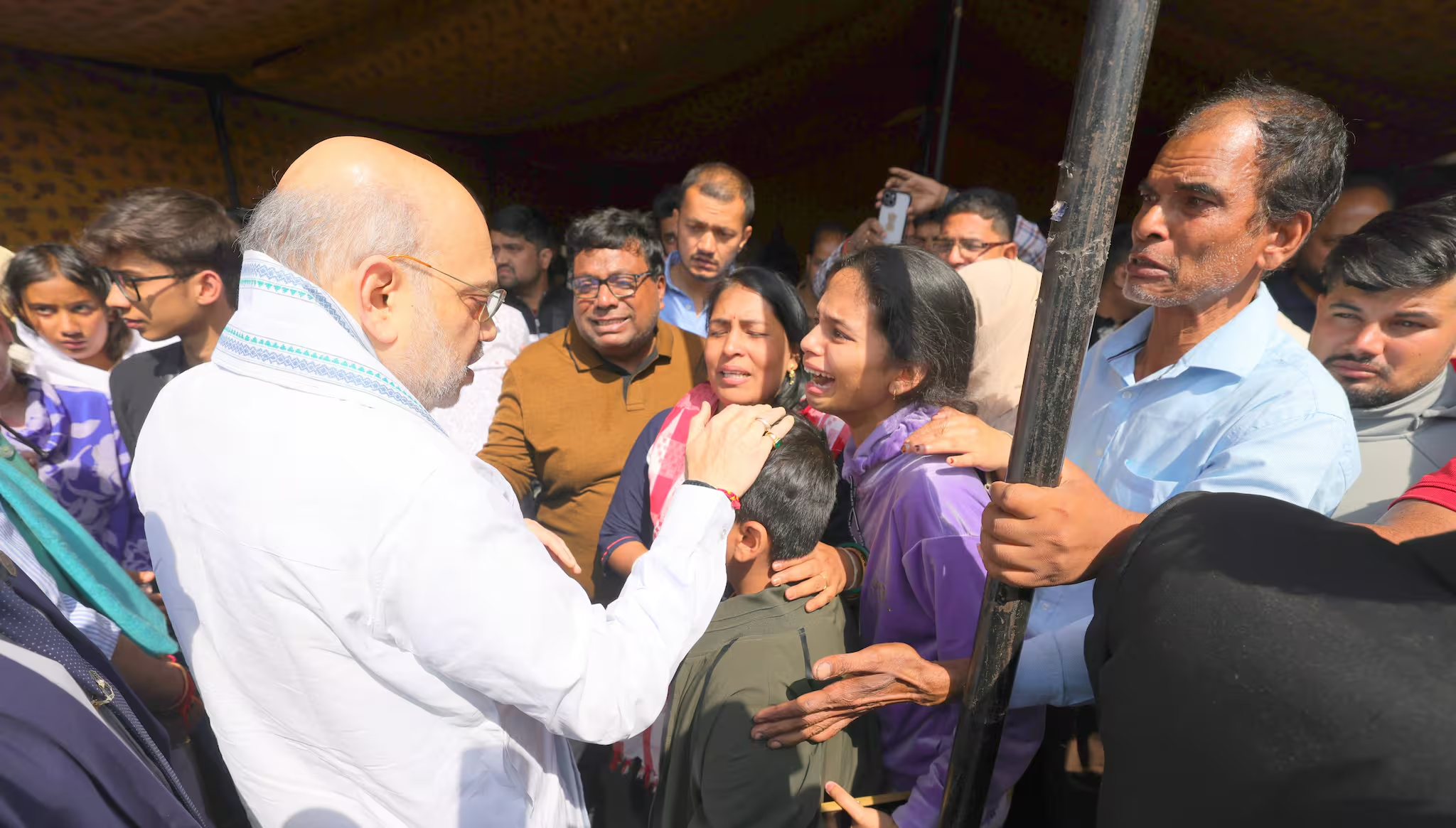
Additional Developments
Diplomatic Measures Escalate Further
-
Expulsion Note Handed to Pakistan’s Top Diplomat
India summoned Pakistan’s top diplomat, Saad Ahmad Warraich, late at night to formally hand over the persona non grata notice for the expelled military diplomats. The move aligns with India’s earlier precedent in 2020, when diplomatic ties were downgraded and mission strengths halved.
-
Pakistan’s Official X Account Withheld
On April 24, the Indian government also took a digital step by withholding access to the official X (formerly Twitter) account of the Government of Pakistan, reflecting a freeze in official digital communications.
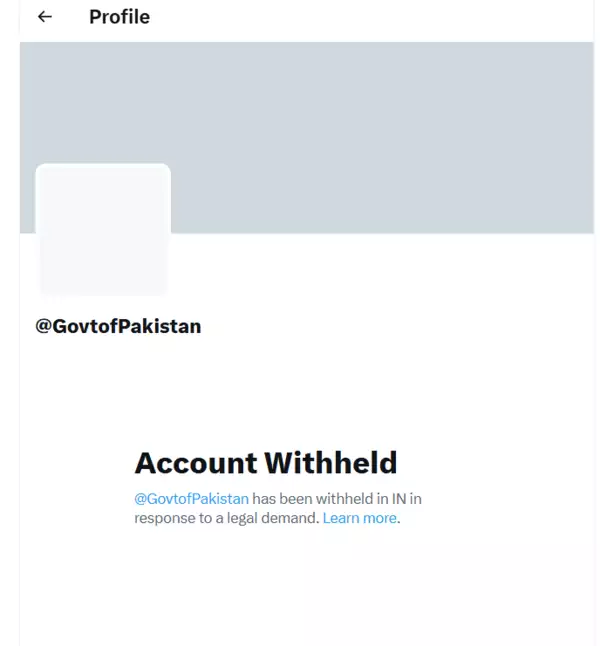
Security Developments on the Ground
-
Armed Encounter in Udhampur
Security forces engaged terrorists in the Udhampur district. Unfortunately, a soldier succumbed to injuries sustained during the encounter, highlighting the ongoing threat in Jammu and Kashmir.
-
Hunt for Pahalgam Attackers Underway
The Indian Army and police have launched a large-scale operation to locate the seven-member terrorist group, which reportedly included several Pakistani nationals.
-
₹20 Lakh Reward for Information on Attackers
A ₹20 lakh reward has been announced by the Anantnag Police for any information leading to the terrorists.
Political and Strategic Responses
-
All-Party Meeting Called by the Centre
An all-party meeting is scheduled to brief national political leaders on the evolving situation and the measures being taken.
The meeting will be chaired by Defence Minister Rajnath Singh, and Home Minister Amit Shah is expected to brief leaders. External Affairs Minister S. Jaishankar may also address the gathering.
The decision follows a precedent set during major incidents like the Pulwama attack (2019) and the India-China standoff (2020).
-
Congress Leader Rahul Gandhi Cuts Short U.S. Visit
Congress leader Rahul Gandhi returned to New Delhi in the early hours of Thursday, cutting short his U.S. visit to attend the Congress Working Committee (CWC) meeting at 10:30 a.m. the same day. Congress General Secretary Jairam Ramesh confirmed the development via X.
Civilian Evacuation and Aviation Measures
To assist families of the victims and stranded tourists:
-
59 flights, including seven special services, operated out of Srinagar to ferry bodies of 25 victims and 123 accompanying family members to their destinations.
-
The Ministry of Civil Aviation ensured that airfares remained at reasonable levels, despite the sudden surge in travel demand following the attack.
Pakistan’s Response
-
Missile Test Notification from Pakistan
Amid the escalating tensions, Pakistan issued a maritime notification announcing a surface-to-surface missile test from its Karachi coast, scheduled between April 24 and 25, within its Exclusive Economic Zone (EEZ). Indian intelligence and defence agencies are monitoring the situation closely.
-
Pakistan’s Strategic Response Underway
Pakistan’s political and military leadership is preparing a comprehensive response to India’s measures. Defence Minister Khawaja Asif confirmed that a session of the National Security Committee, chaired by Prime Minister Shehbaz Sharif, will be held soon. The meeting will include service chiefs and senior cabinet ministers, and is expected to produce a formal countermeasure.
India's response to the Pahalgam terror attack marks one of the most sweeping retaliatory moves in recent memory. By targeting treaties, border transit, diplomatic staff, and visa regimes, New Delhi has made it clear that acts of terror originating from across the border will not go unanswered. As both nations brace for further diplomatic manoeuvres, the global community watches closely, hoping for de-escalation and justice for the victims of the heinous attack.
With inputs from agencies
Image Source: Multiple agencies
© Copyright 2025. All Rights Reserved Powered by Vygr Media.

